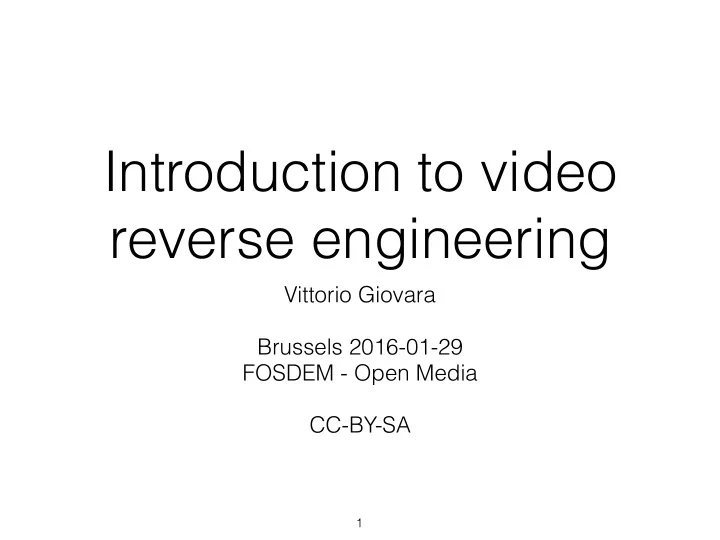

Introduction to video reverse engineering Vittorio Giovara Brussels 2016-01-29 FOSDEM - Open Media CC-BY-SA 1
About me ‣ Libav/FFmpeg developer (~10 decoders) VideoLAN association member ‣ First known use of x264 in broadcasting ‣ Took part to HEVC/H.265 standardization ‣ Pupil of Kostya ‣ vittorio.giovara@gmail.com koda on Freenode IRC 2
What ‣ Reverse engineering can be considered a fundamental element of science ‣ Understand how things work and find rules about their behaviour ‣ As such it can be applied to anything 3
What ‣ ... but let's focus on digital video for now 4
Theory ‣ A video is a series of frames ‣ Frames are data that represent images ‣ They can either be compressed or not ‣ Data is packed in some way 5
Many many ways ‣ Lossless or lossy ‣ There might be a header ‣ Frames contain RGB(A), YUV, deltas, entropy, slices, inter/intra prediction... ‣ Luckily many codecs rip each other off (Real, DivX, VP1-9, and many more) 6
Categories ‣ Screencast ‣ Run-length encoding ‣ Intermediate ‣ Entropy-based ‣ Japanese codecs 7
Tools of trade ‣ Common sense ‣ Specifications and patents ‣ Strings and debug info ‣ IDA/HexRays ‣ Someone to talk with 8
A few examples ‣ Quickdraw PICT • Samples + Spec + Decoder ‣ TDSC.asf • Samples ‣ CSEUvec.dll • Samples + Decoder 9
PICT
TDSC Format : Windows Media File size : 39.3 MiB Duration : 7mn 42s Overall bit rate mode : Variable Overall bit rate : 713 Kbps Maximum Overall bit rate : 717 Kbps Encoded date : UTC 2015-03-02 12:41:49.784 Video ID : 1 Format : TDSC Codec ID : TDSC Bit rate mode : Variable Bit rate : 703 Kbps Width : 1920 pixels Height : 1080 pixels Display aspect ratio : 16:9 Frame rate mode : Variable Nominal frame rate : 30.000 fps Bit depth : 8 bits Language : Chinese (TW) ./avconv -i ~/tdsc.asf -f image2 -frames 1 zlib1.dat ‣ 14
15
5 line tool ‣ Try different compressors unsigned char ibuf[SIZE], obuf[SIZE * 10]; int main(void) { uLong ilen, olen; ilen = fread(ibuf, 1, sizeof(ibuf), stdin); olen = sizeof(obuf); uncompress(obuf, &olen, ibuf, ilen); fwrite(obuf, 1, olen, stdout); return 0; } ‣ Can be easily extended to skip the header dynamically 16
17
‣ Tag based ‣ GEPJ is JPEG in little endian later in the file, WAR means RAW ‣ Count the readable tags, they are 240 ‣ 0x80070000 is 1920 0xC8FFFFFF is -1080 ‣ The 0x28 next to size is suspicious 18
19
‣ Every frames is ZLIB-compressed ‣ TAG-based format with tiles ‣ Uses Windows-header style ‣ Has mixed JPEG and RAW data 20
Canopus HQX STOP - IDA TIME
Why ‣ You can read the Matrix! ‣ Avoiding vendor lock-in ๏ Cineform/GoPro ♒︎ SMPTE-VC5 ‣ Fighting digital obsolescence ๏ FFV1/MKV archiving codec ‣ Daala, Thor, VP10 (Open media alliance?) 28
Thanks Questions? 29
Recommend
More recommend